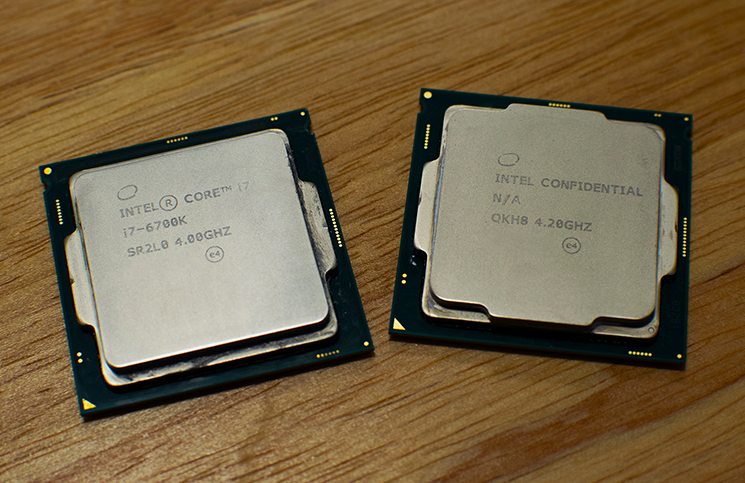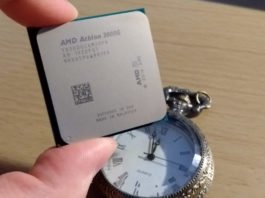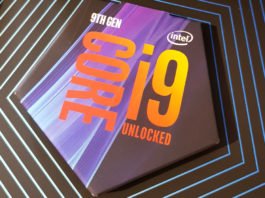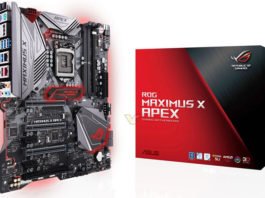Introduction & What’s New – Intel Core i7-7700K Review – i7-7700K vs i7 6700K (Z270)
The new 7th generation Intel Core i7-7700K processor isn’t a massive change over the previous 6th generation Core i7-6700K, but it does have some notable improvements on the surface. The first of these pertain to the clock speeds. Intel has pushed the base frequency up from 4GHz to 4.2GHz with turbo speeds on the i7-7700K being improved to 4.5GHz; this equates to a 7% clock speed increase over the previous generation. The second improvement is support for Intel’s new Optane technology. Optane massively pushes the boundary on non-volatile memory media and it will be interesting to see how the technology is utilised/advanced over 2017. You can find more about Intel’s Optane technology by clicking this link – http://www.intel.co.uk/content/www/uk/en/architecture-and-technology/non-volatile-memory.html
The Intel Core i7-7700K and the Intel Core i7-6700K share many of the same characteristics. They share the same socket with both CPU types being compatible with Z170 and Z270 motherboard chipsets; Z170 boards will most likely need a BIOS update to make the new Kaby lake processors compatible.
If anything, the main upgrade comes in the form of the on-board graphics. The Intel Core i7-7700K features the Intel HD 630 chip which now features support for VP9 decoding and also features 4K HEVC 10-bit encoding and decoding. Although still well below dedicated graphics cards performance, even at the lower end, it’s still a very minor improvement over the previous HD 530 on-board solution.
Specifications
| Intel Core i7-7700K & i7-6700K Specifications | |||||||||||
| Model | Cores / Threads |
CPU Clock (GHz) |
Turbo Boost (GHz) |
Process | Die Size | Cache | IGP | IGP Clock (MHz) |
DDR Support (MHz) | TDP | Launch Price (US 1ku) |
| Kaby Lake Core Processor Family (7th Generation, LGA1151) | |||||||||||
| Core i7-7700K | 4 / 8 | 4.2 | 4.5 | 14nm | TBC | 8MB | HD 630 | ? | Dual 2,400 (DDR4) | 91W | TBC |
| Skylake Core Processor Family (6th Generation, LGA1151) | |||||||||||
| Core i7-6700K | 4 / 8 | 4.0 | 4.2 | 14nm | TBC | 8MB | HD 530 | 1,150 | Dual 2,133 (DDR4) | 91W | $350 |
Test Setup & Methodology
Intel Core i7-7700K & Intel Core i7-6700K
Motherboard – ASUS ROG Maximus IX Hero Z270
Memory – Crucial Ballistix Elite 3000MHz (2x8GB) DDR4
Graphics – ASUS GTX 1060 STRIX 6GB
Cooler – Cooler Master TX3I
PSU – be quiet! 850w Dark Power Pro 11
Storage – Crucial MX300 525GB SSD
OS – Windows 10 Professional 64bit
Due to the difference in clock speeds between the Intel Core i7-7700K and i7-6700K, I bumped the multiplier up on the i7-6700K to 4.5GHz to match the bump in clock speed that the Core i7-7700K received and to give the processors an even playing field. This is to show if there is any IPC performance gains present as both of these processors feature identical specifications.
Benchmarks
AIDA64 – CPU Queen/CPU Photoworxx/CPU AES/Memory Read/Memory Write/Memory Copy/Memory Latency
Cinebench R15 – CPU/OpenGL
PCMark 8 – Conventional Suite
3DMark – Fire Strike/Time Spy
Tom Clancy’s: The Division – 1080p/1440p/2160p (4K)
Benchmark Results
AIDA64
Cinebench R15
PCMark 8
3DMark
Tom Clancy’s: The Division
Conclusion
Now that the new 7th generation Intel Core i7-7700K has been tested against the previous 6th generation Intel Core i7-6700K at the same clock speeds (4.5GHz), I have come to my overall conclusion. There is no actual performance increase on the IPC and aside from a 200MHz base clock bump and 300MHz boost clock bump, there are absolutely no gains to be had. Of course, a bump in clock speed is great if pricing is on a level playing field, but the only group to find a definitive advantage with Kaby Lake over Skylake is the overclocking community.
A lot of chips have been reported to run 5GHz on air as opposed to the plethora of Intel Core i7-6700Ks which struggle to even hit 4.8GHz under the same conditions, this is a very welcomed improvement if I say so myself. What this means, aside from the clock speed and the new built in Intel HD 630 graphics processing unit, these chips are virtually identical in every way and I find it hard to believe that there has been such a big hype over the launch.
That isn’t to say that the Intel Core i7-7700K isn’t good, I actually think the bump in clock speed is welcomed as I have experienced some Core i7-6700Ks that struggle to maintain 4.5GHz which is crazy; the Core i7-7700K runs this at boost with no need for tweaking. I just think that if you already own a Skylake 6th generation Intel processor, there is absolutely no need to contemplate side stepping across to Kaby Lake; that is exactly what it would be, a side step and not an actual upgrade.
The only thing I will say that has been prevailing with the Intel Kaby Lake 7th generation launch is motherboard manufacturers have been able to up their game on motherboard ranges and improve certain aspects such as on-board audio, USB 3.1 support and of course, better power delivery via power phases and MOSFETS. Everything else really has been a little bit of a bust and unless you are in the market for a new quad core processor, you probably won’t feel the benefits as much as we would have liked you to have.
Intel’s 14nm process has been slightly improved upon this time round with Kaby Lake, but not enough to justify an upgrade over Skylake; unless of course you are jumping from a Core i3/i5 to the i7. With AMD’s Ryzen processors just around the corner, pricing is likely to be more competitive than usual and with no definitive launch pricing (at time of writing), I fully expect the Intel Core i7-7700K to cost between £350-370 at a maximum. If you can find an Intel Core i7-6700K for less than £350, this may be the better option as 6th generation processors are supported on the new Z270 chipset, but as an overclocking enthusiast myself, the Kaby Lake Core i7-7700K does give me hope that there is a little more to be had from the 14nm process.
Let’s hope AMD can push further improvements on IPC performance from Intel over the coming year, otherwise we are going to have a pretty stagnated CPU market and this isn’t good for anyone!
Huge thanks to Intel for sending the Intel Core i7-7700K in for review.
Note: We omitted any overclocking testing due to the sample being an engineering sample (non-retail). We of course will be publishing an Intel Core i7-7700K overclocking guide so look out for it when we get our hands on retail chips at launch!
-
Performance
-
Design
-
Value
Summary
Pros:
– Offers a nice clock speed improvement over the previous generation Intel Core i7-6700K processor
– Compatible with the Z170 and new Z270 chipset
– Tons of overclocking headroom (Kaby Lake overclocking guide to come very soon)
– Intel Optane does look to have phenomenal potential for the future
– Improved memory latency over Core i7-6700K
Cons:
– No improvement on IPC performance on 6th generation Core i7-6700K
– Launch pricing looks weak compared to Core i7-6700K’s current pricing
– AMD’s Ryzen is just around the corner and looks very interesting



















